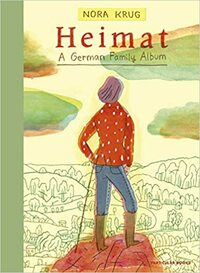Take a photo of a barcode or cover
I feel a sudden pain, shallow but sharp and all consuming as a paper cut, because even inherited memory hurts. ~ Nora Krug
Just no time and I have to return to library
A beautiful graphic memoir - both visually and in terms of content - about a young German woman investigating her family's past in Nazi Germany. Did they collaborate? Did they resist? The answers are uncertain but the process of discovery is enlightening. A terrific exploration of the complexities of family and history and the challenges of uncovering the truth about the past, especially when it's a past full of guilt and shame.
What an odd book. The briefest explanation I can make for that assessment is that what is good about it is very good, but it, in my opinion, has a questionable goal to begin with and then seems to not recognize what it accomplished while seemingly missing its goal. Let me explain. The author is the daughter of two parents who were born in Germany immediately after World War II. The author and her parents have all been living in America, not Germany, for some time. Her parents' parents (her grandparents) were alive and well in Germany during the Nazi regime. One grandparent served in the German Army. In some cases, siblings of the parents were alive as children before the war ended, but one fought and died in battle in the German SS toward the later part of the war. The author is quite cognizant of the Holocaust and her connection to relatives that were alive and active in Nazi Germany. She is also quite guilt ridden about the connection. Why is she guilt ridden? Neither she nor her parents were alive during Hitler's time. Feeling family shame? Okay, maybe, depending on what her relatives did or did not do. But guilty? Does she not know the difference? In investigating her family past to decide just how guilty she should feel, she (1) uses a highly creative mechanism for doing that blends well with what she trying to convey to the readers, and (2) she is remarkably adept, as someone with apparently no background in investigative journalism, at finding information, validating what she finds, and asking proper and detailed questions about what it means. In short, she does a bang up job. But, yet, to not quite decide whether she should feel guilty or not. In the author's defense, she does explain growing up in the We're-not-at-all-proud-to-be-Germans national orientation offered to her as a German youth, still years after the atrocities had ended, so she admits to feeling -- what? -- groundless in her heritage? I couldn't help trying to compare her struggle with guilt about Nazi Germany with the utter lack of guilt the average American displays for "...the abduction and enslavement of African people, the displacement and genocide of Indigenous people, and the annexation of Mexican lands..." which sociologist, Robin DiAngelo, tries to get white Americans to acknowledge in her book, White Fragility. Moreover, as historian, Timothy Snyder, makes clear in his book, Bloodlands, elements of the former Soviet Union also did a damn fine job of committing horrendous and massive civilian atrocities during the same period as the Germans. Should all Russians be equally racked with guilt? I guess I will repeat my point. The author pulls out lots of important and meaningful questions for all of us to ask ourselves...but it seems she never gets a satisfying answer to her own question that prompted the book to begin with. I find that, at best, unusual.
Incredible. This one will stay with me for a long time.
Picked this up on a whim and read it as one of my books for the Dewey’s 24 hour Readathon. Honestly, I was excited but apprehensive about this book… and in so many ways I was right to. The story is just as layered and complicated as you might expect, and combining that with the unique combination of art, photos, scanned documents, and the story itself… this is a rollercoaster. Lots of moments I really felt strong negative feelings toward the author or the family member she was writing about. And other moments I heartbroken or overjoyed with them… There ARE some things I wish she had explored more, and some things I wish she’d left out, but ultimately I appreciate the willingness to put it out there. There isn’t a right answer, a solution, or any absolution here, there never will be. But there’s humanity.
It challenges me and my own morality. A really wonderfully done exploration.
It challenges me and my own morality. A really wonderfully done exploration.
challenging
emotional
informative
reflective
medium-paced
informative
reflective
slow-paced
challenging
emotional
informative
reflective
fast-paced
Belonging or "Heimat" in German is a mix of a graphic novel and historical research text. It follows the author researching her German genealogy pre and post Second World War. The guilt of 20th-century fascism and the search for redemption are some of the main themes. Surprisingly, the book is very interesting to read and lighthearted in art style. Therefore, it comes in contrast with the tragic stories that Nora Krug narrates and somehow humanizes them.



